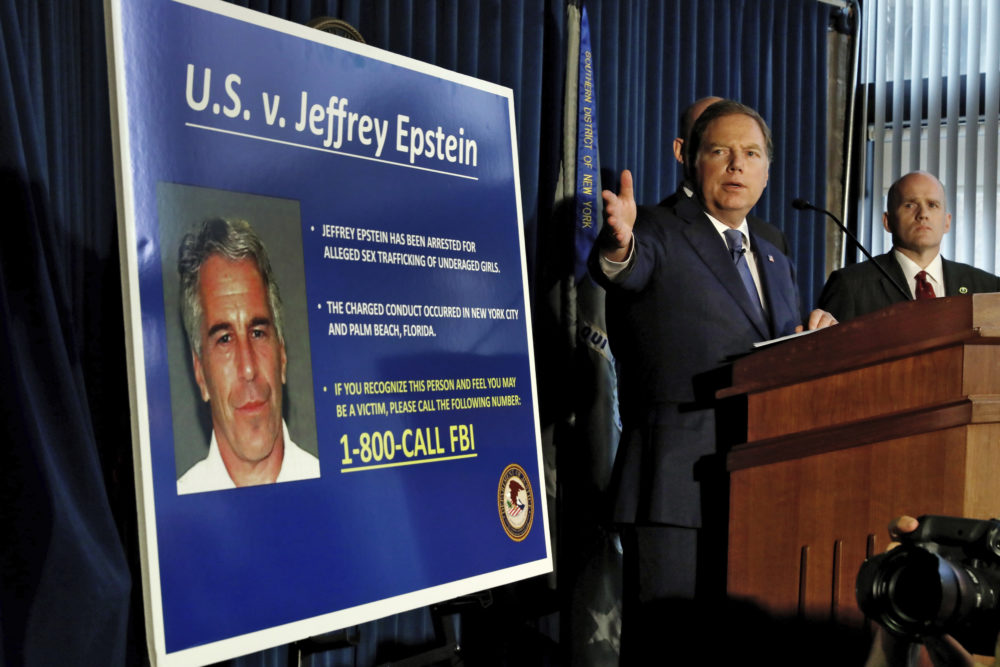Advertisement
Commentary
When Justice Is Up For Sale

The legal fates of two old, rich white guys — both accused sex criminals — will tell us much about the privileges of wealth in 21st-century America.
The sex trafficking charges brought by federal prosecutors against hedge fund manager Jeffrey Epstein, 66, may finally hold him accountable for his alleged crimes. Since investigators brought the charges against him in Federal District Court in Manhattan and seized nude photos of underage girls from his palatial Upper East Side townhouse, Epstein has been the target of outrage from people on the left and the right, including Nebraska Republican Senator Ben Sasse, who said earlier this week, “Justice doesn’t depend on the size of your bank account.”
But pending the outcome of the case against Robert Kraft, Sasse looks to be overly optimistic.
The diamond-studded legal guns representing the 78-year-old New England Patriots owner (one of them a former Epstein lawyer) may save him from charges that he solicited prostitution at a Florida spa. Yet while Kraft could dodge a trial, the women for whom he allegedly paid $100 each, for two sex acts, simmer in hotter water.

Their savings have been frozen, and they face sex work charges, including a felony punishable by up to 15 years in jail. They probably can’t vaporize that by hiring pricey legal talent.
We can cheer retribution for finally collaring Epstein (he has pleaded not guilty), but the Kraft affair is likely to demonstrate how privilege still packs its punch.
Clearly, Kraft’s case does not involve crimes as shocking to the conscience as those with which Epstein is accused. The football mogul, who also maintains his innocence, will owe his salvation (should it come), in part to rickety police work. The court tossed video from the spa that didn’t shield the privacy of legitimate consumers. But given Kraft’s cryptic public apology after being charged — “I am truly sorry. I know I have hurt and disappointed my family, my close friends, my co-workers, our fans, and many others who rightfully hold me to a higher standard” — the issue remains the stark divide between his fate and that of the women involved.
Meanwhile, we’re learning more by the minute about the extraordinary privilege Epstein relied on to rescue him once before. In 2008, federal prosecutors in Florida prepared a 53-page indictment accusing him of being a sexual predator. Instead, Epstein pleaded guilty to procuring minors for prostitution and received an 18-month sentence (he could have been sent away for life) in a deal with lead prosecutor Alexander Acosta. Acosta is now Donald Trump’s secretary of labor (and, oh, Sasse voted in favor of his confirmation — after questioning the Epstein deal).
We can cheer retribution for finally collaring Epstein ... but the Kraft affair is likely to demonstrate how privilege still packs its punch.
Epstein served 13 months of that sentence. His legal wrist slap 11 years ago is under review by the Justice Department, while Nancy Pelosi and even some conservatives are calling for Acosta’s head to roll. It should. On Tuesday, he wrote a smug tweet celebrating Epstein’s arrest on “new evidence” — which may well include last year’s exposé in the Miami Herald about his disgraceful, closed-door deal in ’08. That deal, contra Acosta, was made despite “extensive, detailed allegations.”
Even billionaires are presumed innocent until proven guilty. It also goes without saying that people like Epstein and Kraft shouldn’t be able to buy their way out of justice if they are guilty.
But let’s say this loud and clear: sex trafficked girls are victims, not criminals. How it’s possible to “procure minors for prostitution” (the crime Epstein admitted to in his 2008 plea) is questionable and disturbing. Minors aren’t working as prostitutes.
When it comes to Kraft, there are two possible legal vaccines for the virus of inequality attached to sex work. One, favored by some progressives, would decriminalize that work. Advocates point to New Zealand, where legalizing prostitution 16 years ago made sex workers safer and more empowered vis-a-vis clients. But the Kiwi case is uniquely successful. A Harvard review of 116 nations found those that decriminalized prostitution saw higher human sex trafficking than in countries where sex work is prohibited.
Given that, and the dangers in America of sex work, the better alternative is to go Sweden’s route of holding johns, not prostitutes, criminally responsible. That, and offering aid to women who want to leave the business, have brought the Swedes plunging prostitution and trafficking rates. That’s the clearest policy lane to a solution.
Jim Braude, of WGBH, suggests a path to personal repentance for Kraft: pay the legal bills of the women at the spa. He can afford it. It would be a lot more than $100 for the alleged sexual act. And, Braude opines, “Seems to me it’ll clearly help them, and likely help him, too.”
